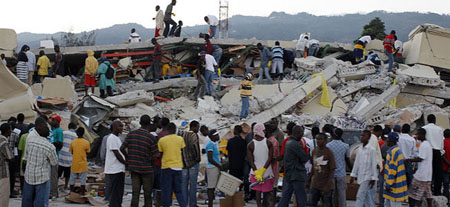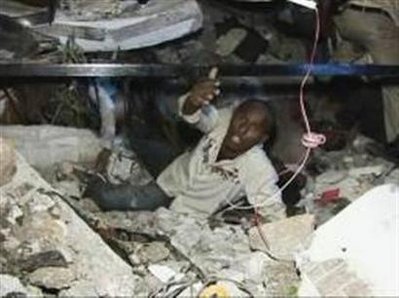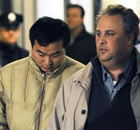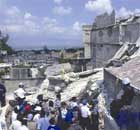Global General
Tens of thousands feared dead after Haiti quake
(Agencies)
Updated: 2010-01-14 20:14
 |
Large Medium Small |
 |
|
Resident search for survivors among the debris after an earthquake in Port-au-Prince on January 13, 2010. [Agencies] |
PORT-AU-PRINCE, Haiti: Traumatized Haitians slept out in parks and streets on Thursday, fearing aftershocks to the catastrophic earthquake that flattened homes and government buildings and buried countless people.
Tens of thousands of people were feared dead and many were believed to be still trapped alive in the rubble of the major 7.0 magnitude quake that hit Haiti's capital on Tuesday.
There were no signs of organized operations to rescue those trapped in debris or remove bodies and doctors in Haiti, the poorest country in the Western Hemisphere, were ill-equipped to treat the injured.
"They sing because they want God to do something. They want God to help them. We all do," said Hotel Villa Creole employee Dermene Duma, who lost four relatives.
Foreigners slept around the hotel's pool and scores of injured Haitians lay outside the damaged hotel.
Tens of thousands wandered dazed and sobbing in the chaotic, broken streets of Port-au-Prince the day after the earthquake, hoping desperately for assistance.
Bodies were visible all around the hilly city: under rubble, lying beside roads, being loaded into trucks. Scattered bodies were laid out on sidewalks, wrapped neatly in sheets and blankets. Voices cried out from the rubble.
Residents tried to rescue people trapped under rubble, clawing at chunks of concrete with bare hands. Men with sledgehammers battered at slabs of debris in collapsed buildings searching for survivors.
|
 A man calls for help while being trapped at the Port-au-Prince University, after a major earthquake struck, in Port-au-Prince in this January 13, 2010 video grab. [Agencies] |
One young man yelled at reporters in English: "Too many people are dying. We need international help ... no emergency, no food, no phone, no water, no nothing."
Asked by a CNN reporter how many people had died, Haitian President Rene Preval replied, "I don't know ... up to now, I heard 50,000 ... 30,000." He did not say where the estimates came from.
Nations around the world pitched in to help. French Foreign Minister Bernard Kouchner said on Thursday French planes would evacuate 60 injured people from its one-time colony and fly them to Martinique for treatment.
"Our three planes will leave with 60 injured people and take them to Martinique. I believe they will be the first people to be evacuated," he told France Inter Radio, adding that others would be flown out at a later date.
The United Nations, whose five-story headquarters in Port-au-Prince was destroyed, said at least 16 members of its 9,000-strong peacekeeping mission, including 11 Brazilian soldiers, had been killed. Preval said mission chief Hedi Annabi was dead but the world body could not confirm that.
Preval called the damage "unimaginable" and described stepping over dead bodies and hearing the cries of those trapped in the collapsed Parliament building, where the Senate president was among those pinned down by debris.
OVERWHELMED BY DEVASTATION
"It's the worst I've ever seen," the Salvation Army's director of disaster services in Haiti, Bob Poff, told CNN. "It's so much devastation in a concentrated area. It's going to take days, or weeks, to dig out."
The quake's epicenter was only 10 miles from Port-au-Prince. About 4 million people live in and around the city, which was rocked by aftershocks as powerful as 5.9 magnitude.
Normal communications were cut off, roads were blocked by rubble and trees, electric power was interrupted and water was in short supply. The only lights visible in the city came from solar-powered traffic signals.
Haitian Red Cross spokesman Pericles Jean-Baptiste said his organization -- accustomed to dealing with disaster in a country dogged by poverty, catastrophic natural disasters and political instability -- was overwhelmed and out of medicine.
"There are too many people who need help. ... We lack equipment, we lack body bags," he told Reuters.
UN peacekeeping personnel around the city seemed overwhelmed by the enormity of the recovery task ahead.
"We just don't know what to do," a Chilean peacekeeper said. "You can see how terrible the damage is. We have not been able to get into all the areas."
RESCUERS EN ROUTE
US President Barack Obama spoke by phone to the UN secretary-general and the leaders of Brazil, Canada, Mexico and Chile about efforts to assist Haiti but was not able to contact Preval, the White House said.
Obama pledged swift, coordinated support to help save lives. The Pentagon was sending an aircraft carrier and three amphibious ships, including one that can carry up to 2,000 Marines.
The United States, China and European states were sending reconnaissance and rescue teams, some with search dogs and heavy equipment, while other governments and aid groups offered tents, water purification units, food and telecoms teams.
Medical aid group Doctors Without Borders said its three hospitals in Haiti were too badly damaged to use and it was treating the injured at temporary shelters.
"What we are seeing is severe traumas, head wounds, crushed limbs, severe problems that cannot be dealt with the level of medical care we currently have available," said Paul McPhun, operations manager for the group's Canadian section.
Haiti's cathedral was destroyed and media reports said the archbishop of Port-au-Prince, Monsignor Joseph Serge Miot, had been found dead in the wreckage of the archdiocese office.
One of the city's best-known hotels, the Montana, collapsed, said Haitian businessman Manuel Deheusch, a tile factory owner, who added the hotel owner, his aunt, had died in the rubble.
Deheusch was worried about lawlessness. "All the policemen are busy rescuing and burying their own families," he said. "They don't have the time to patrol the streets."











